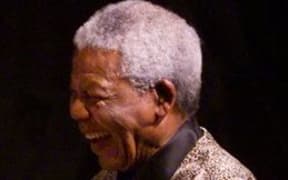Nobel peace laureate Desmond Tutu says he is glad Nelson Mandela is not alive to witness the current state of South Africa.

The late Nelson Mandela Photo: AFP
"I'm glad that Madiba is dead," Tutu told South Africa's Sunday Times newspaper.
"I'm glad that most of these people are no longer alive to see this," he added, referring to what he saw as the slow pace of change in the 20 years since apartheid.
His comments were published as South Africa was celebrating the 20th anniversary of its first all-race elections that ended decades of racial oppression under apartheid and brought Mandela to power as its first black president.
"I didn't think there would be a disillusionment so soon," the Anglican archbishop emeritus was quoted as saying.
Tutu, 82, who is still regarded as a moral beacon in South Africa, had confirmed on Wednesday that he would not vote for the ruling ANC Party in the 7 May elections.
He has been openly critical of current President Jacob Zuma's graft-tainted administration, but on Wednesday chose also to highlight the positives over the two decades since the fall of apartheid.
Flag hero
But the 20th anniversary commemmorations are continuing, and one focus is the multi-coloured flag of modern South Africa - a symbol of its post-apartheid rebirth - which was created in on frantic week by an unsung hero, the BBC reports.
On a Saturday night at the end of February 1994 Fred Brownell's phone rang. The voice on the other end asked him to get a new national flag designed - within a week.
He sketched three arms converging from the flagpole side of the flag to become one.
His first idea was for the three-pronged shape to be coloured red, with green and blue at top and bottom, but he soon concluded it looked better with the colours switched around - the three-pronged shape in green, red at the top and blue at the bottom.
But the flag needed other colours too. "I think one must realise that red, white and blue or orange, white and blue harked back to South Africa's colonial heritage," Brownell says.
Gold was the first he added, then black - both colours found on the flags of the African National Congress, the Zulus' Inkatha Freedom Party, and various other political groupings in South Africa.

